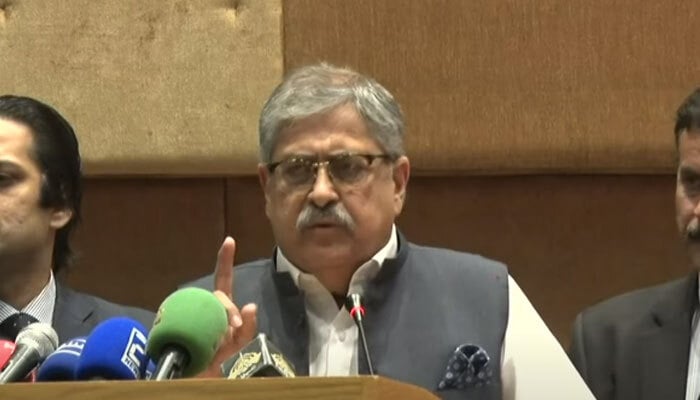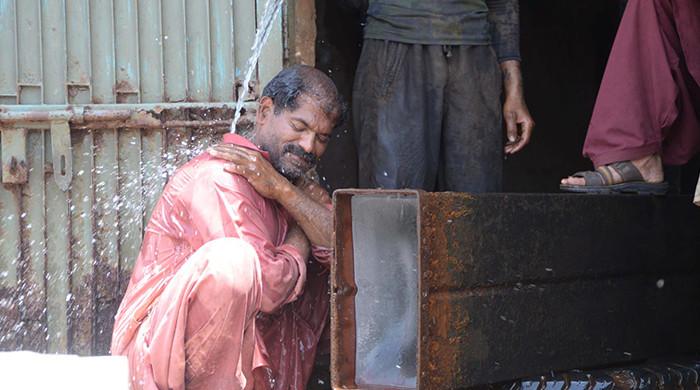A judge who is affected by social media, violates his oath: Justice Athar Minallah
SC disposes more cases compared to those filed in apex court by settling more than 5,000 cases in three months, says CJP Isa
January 20, 2024

- Everyone should criticise, but also trust judiciary: Justice Minallah.
- He says everybody should ask himself where he's heading to.
- SC judge says states can no longer control freed of expression.
ISLAMABAD: Supreme Court Justice Athar Minallah on Saturday said social media should not influence judges, adding that if a judge is affected by it then they are violating their oath.
Addressing the second law bridge workshop on superior court reporting at a private hotel in Islamabad, Justice Minallah said if even critics trusted the court then it was a test of the judiciary. Everyone should criticise, but also trust the judiciary, he maintained.
Referring to the lack of freedom of speech in the country, the top court judge said the endless process of censor kicked off after the state’s censoring Quaid-e-Azam Muhammad Ali Jinnah’s August 11, 1947 speech.
Reminiscing his first case as a judge, he said it was a bail plea and a 16-year-old suspect was before the court for putting up a banner against an apex court judge. The subordinate court rejected the plea saying he had committed a crime against the entire judiciary, he said adding that nobody tried to find out who got the banners made.
The SC judge said Pakistan would not have been split into two, if the oath was not transgressed.
He said the states could not control the expression of opinion in the technological era. However, he said the reporters doing vlogging have an economic interest too therefore they should maintain balance in their comments.
Justice Minallah said he did not consider himself worthy of telling a reporter what his ethics were.
However, he advised the journalists that revealing the identity of a child or woman or misreporting something was a violation of the journalism’s ethics, he said adding that he learnt a great deal of journalism from court reporters.
“When the matter of 18th constitutional amendment was raised, many forces were against it. A reporter asked me, what will the Supreme Court do about the 18th Amendment? I replied ‘in my opinion, the SC should not interfere in the constitutional amendment',” he said.
The apex court judge said he had said he would resign if the 18th amendment was annulled and the next day news was published that “Athar Minallah has threatened the court”.
Senior lawyer Aitzaz Ahsan asked him to do something against the news, but he said no that’s what he had said, he added.
Citing former Ugandan president and the modern world history's most brutal dictator, Idi Amin, Justice Minallah said, "A society is ruined, if someone gags freedom of expression like Idi Amin."
'Accountability begins with information'
Terming the right to information as being every citizen's right, Chief Justice of Pakistan (CJP) Qazi Faez Isa stressed that the law binds the institutions, subordinate to the federal government, to provide information to the masses.
Underscoring the freedom of the press as enshrined in Article 19 of the Constitution, the chief justice compared past and present practices about the right to information.
Previously, questions could be raised as to why someone seeks a particular piece of information, however, today the tables have turned, as now the institution declining to provide information must clarify as to why it can't do so.
Recalling important measures taken by the apex court since his oath as the CJP, the top judge recalled that the apex court has settled more than five thousand cases in a span of a few months.
"5,305 cases have been settled in three months [...] for the first time it has happened that more cases were disposed of compared to the number of cases filed [in the top court]," the chief justice said.
"We decided to air the full-court proceedings," the chief justice said while lamenting that the full court had not been convened for four years.
Stressing that accountability starts with information, the CJP said that for the first time, the apex court's quarterly report — from September 17 to December 16 — was published on the apex court's website.
"We have presented ourselves [judges] for accountability before you [people]," he said while stressing that the people should have access to the information regarding an institution that is dependent on the tax given by them.











